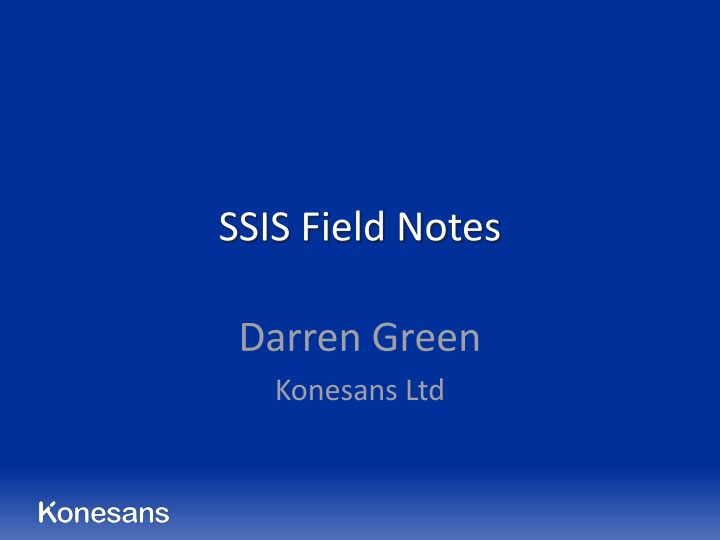
Standards for SSIS Field Notes, Logging, and Solutions
Explore best practices for SSIS field notes, checklist standards, logging configurations, common design decisions, and solution structures. Learn about source control products, naming conventions, performance monitoring, logging options, and more in the ETL/ELT environment to improve your data management processes.
Download Presentation

Please find below an Image/Link to download the presentation.
The content on the website is provided AS IS for your information and personal use only. It may not be sold, licensed, or shared on other websites without obtaining consent from the author. If you encounter any issues during the download, it is possible that the publisher has removed the file from their server.
You are allowed to download the files provided on this website for personal or commercial use, subject to the condition that they are used lawfully. All files are the property of their respective owners.
The content on the website is provided AS IS for your information and personal use only. It may not be sold, licensed, or shared on other websites without obtaining consent from the author.
E N D
Presentation Transcript
SSIS Field Notes Darren Green Konesans Ltd
My Checklist Standards Logging Configuration
Common Princiapls Common design decisions or patterns Logging Frameworks Custom vs Stock
Basic Standards Solution and Project structure ETL vs ELT Staging Custom components
Source Control Products Team Foundation Server Subversion (Visual SVN) Others Issues Cannot merge or use standard conflict resolution BIDS Helper- Smart Diff TFS, SourceSafe,File BI Smart Diff Subversion
Naming Conventions Prefix notation, e.g. DFT for Data Flow Task http://consultingblogs.emc.com/jamiethomson/ Expand Name property SQL Create Year Staging Table Expand Description property Create the year named staging table. Any existing table will be dropped first. Documentation tools are not clever
Logging Performance monitoring Real-time monitoring Trending to justify upgrades Re-write problem packages Upgrade hardware / network / environment Problem solving Why did the job fail last night?
Logging Options Built in SSIS logging Good for standard stuff, including errors Maintenance routine to prune records Delete Info daily, Warnings weekly, Errors monthly Custom SSIS logging Log process specific metrics - row counts Event Handler or Control Flow Windows Logging Event Log Performance Monitor
Prune Delete in Chunks SET @Count = 1000 WHILE @Count IS NOT NULL AND @Count > 0 BEGIN DELETE TOP (@Count) FROM dbo.sysdtslog90 WHERE StartTime < @MinStartTime SET @Count = @@ROWCOUNT -- Pause for 0.2 seconds WAITFOR DELAY '000:00:00.200' END
Frameworks Consistent logging approach Process or package state Passing state between package processes Saving state for the next run Last extract date Complete run only once per day Dynamic execution workflow Managed in tables not Control Flow Easier to manage logical units and reuse
Frameworks Standard approach reduces costs Lower support costs Higher quality through reuse Cost of applying and maintaining framework Maintainable frameworks are key! Custom components encapsulate code Use the API to bulk apply changes
Custom Components Task Pipeline Component Source Destination Transformation Log Provider Connection Manager For Each Enumerators
Using Custom Components? Easy to manage and update Good for re-use Can add/edit functionality easily One file per machine for all packages Good for frameworks or complex operations Good debugging and testing support Require .NET development skills External dependency Additional step during the initial deployment, but also single update step thereafter
Stock Components & Scripting Faster to develop Familiar and easy to understand Don t write your own data flow engine in a script component! Acknowledge the need for reuse when it exists and create a shared external assembly Self contained - No external dependency Copy and paste package maintenance Not good for frameworks or common patterns
Recovery & Restarts Checkpoints Native CheckpointFileName, SaveCheckpoints, FailPackageOnFailure Task level restart only Partition your Data Flow Raw files Variable values are persisted Configurations not refreshed Event handlers within checkpoint scope
Recovery & Restarts Auto-Recovery Roll your own Check with IF EXISTS Framework workflow Table of packages with status Package or task level restart Variables and precedence constrains expressions Delete and re-load No change tracking or updates
Anti-Pattern #1 Send Mail Task for Errors Control Flow or Event Handlers Exceptions cause multiple events Use external host to handle exceptions SQL Agent Use a report
Anti-Pattern # 2 Multiple Configuration Types Use one configuration type Use indirect or ordered pointer configuration Easier for support and deployment
Sorting Why sort? Merge Join Ordered Analysis Running totals Ranking Script Component Custom Component Rank Transform
Sorting How to sort? Sort Transformation Ordinal Nsort Ivolva ExtraSort (2005) Sort in Source ORDER BY
Thank you Questions? DarrenGreen darren@konesans.com www.konesans.com
